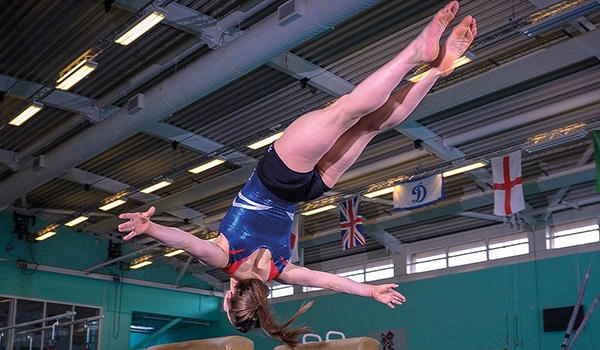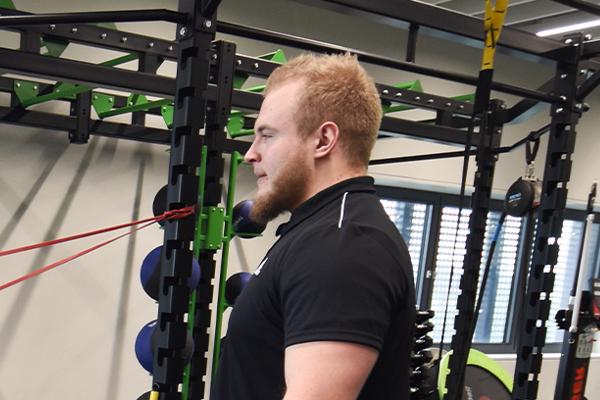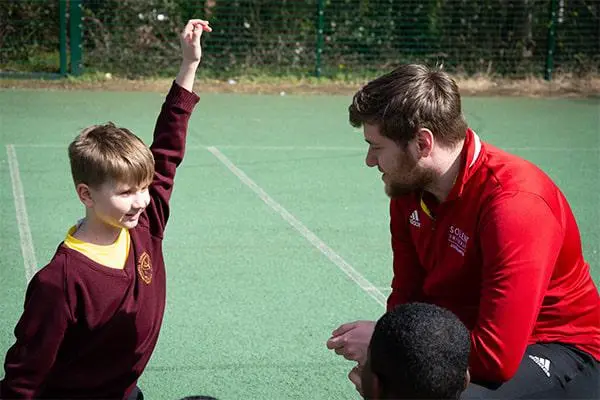
“The lecturers have worked in many different fields and sports, which is great as they each bring different experiences.”


Gain a comprehensive understanding of sport and exercise performance with this BASES-endorsed degree that combines access to specialist facilities with professional placements and hands-on learning.
You'll have the option for a placement year between the second and third years of study, where you have the opportunity to work in industry, gaining valuable employment and experience.
This degree is founded upon the underlying principles of physiology, psychology and biomechanics. The course combines these scientific principles with highly practical skills, helping to prepare you for a career in the sport and exercise science industry.
Modules and assessments have been created to develop key employability skills and to complement your degree studies, you’ll be encouraged to prepare for BASES and UK Strength and Conditioning Association (UKSCA) professional accreditation.
To help prepare you for a career in the sports industry, an applied and hands-on approach is encouraged. Through professional placements and applied practice you will gain first-hand experience of working with teams and athletes in a high-performance environment. With support and mentoring from the course team, past students have provided sport science support to Premiership rugby and football players, Olympic athletes, and national teams.
Throughout your degree, you’ll have access to a range of professional facilities such as our specialist BASES-accredited physiology laboratory and state-of-the-art biomechanics, sport and exercise psychology laboratories, our £28m sports complex, the award-winning Spark teaching building and a 24-hour library service.
Our academic team are all highly experienced within the industry and have extensive teaching, research and professional backgrounds. This ensures your learning experience will be informed by the latest evidence-based research and industry developments.
Contact international admissions
Email: Call:Endorsed by:

Industry links with high-level sports teams, enables students to gain first-hand experience in a high-performance environment.

This course offers additional qualifications for you to obtain with your degree
If you're not quite ready for a full undergraduate degree, there's alternative entry through one of our foundation years
You have the opportunity to obtain a professional membership as part of this degree
This course has access to specialist facilities
After successfully completing your studies, there's an opportunity to continue your studies at Solent
You have the opportunity to study abroad in one of our partner universities for a semester on this course
This course is ideal for anyone with a passion for sport and exercise, in particular the science behind elite performance. Applications from mature students looking for a change of career are welcomed.
The skills you’ll develop on this course open up a wide range of career opportunities in sport and exercise science, across every sport imaginable. You could work with professional, elite or Olympic athletes, ensuring they maintain peak fitness in world-class competitions, or with hospitals and health organisations to develop training and recovery programmes for patients suffering injury or disability. You could also work with schools or even teach, developing fitness programmes and encouraging the next generation of athletes to excel.


Hear from Solent alumni about where their careers have taken them and how studying at Solent prepared them for their future.

“The lecturers have worked in many different fields and sports, which is great as they each bring different experiences.”

The course is delivered by staff who have extensive teaching, professional and industry experience. Staff are committed to delivering an excellent student experience which blends theory and practice through real-world learning opportunities.

Course Leader

Senior Lecturer

Senior Lecturer

Lecturer

Lecturer

Lecturer

Lecturer

Senior Lecturer

Lecturer

Course Leader

Senior Lecturer

Lecturer

Technician
The University cannot guarantee any particular members of staff will teach specific aspects of the course in the future, but will endeavour to ensure the teaching team maintains their balance of experience and qualifications.
Students on this course have access to the University's industry-standard sport and exercise facilities, including the Sports Complex, physiology lab, biomechanics lab and sport and exercise psychology lab.
Our vibrant campus brings state-of-the-art facilities to enhance your learning and elevate your student experience. Our award-winning teaching building, The Spark is centred around students and offers a stimulating study environment with flexible learning spaces. Away from studying, why not try out the gyms, fitness studios and sports halls in our £28 million Sports Complex, or watch a blockbuster film at our student-run cinema with Dolby Atmos audio.
Broaden your horizons by adding an international dimension to your CV – essential to achieving success in today’s fast-changing, global environment.
Studying, working or volunteering in another country could be the experience of a lifetime. Enhance your degree by developing important global skills such as knowledge of other countries, language skills, intercultural awareness, adaptability and confidence.
For more information, please email international.mobility@solent.ac.uk.

This module will introduce you to the fundamentals of biomechanics. These include but are not limited to linear kinematics and kinetics and angular kinematics and kinetics. Understanding these biomechanical principles will allow you to apply them to sport and exercise in relation to human movement.
This module forms a large proportion of the competencies required in becoming a qualified fitness instructor. If you are already qualified and working in the industry, this module will also elevate and enhance your skills, knowledge and technique and take you to the next level in both competence and professionalism.
The module aims to introduce you to the anatomical and physiological principles of the human body and how they enable exercise to be undertaken.
This module will orientate you in the key skills associated with that of an “informed citizen”. You will be encouraged to demonstrate the steps required to undertake a small-scale health and exercise-related research project.
In this module you will learn how our body and mind take in information from the environment to execute sporting skills. Examples of this include how our eyes pass information from the environment to the brain or how our memory systems work.
During this module, you will cover topics relating to both sport and exercise psychology. You will explore how different psychological constructs e.g., confidence and motivation, impact sporting performance. You will also learn about how psychological principles can explain how individuals adopt and maintain more healthy and physically active lifestyles.
Solent’s curriculum framework builds on our unique, creative and applied approach to teaching. The transformation of students’ lives is at the heart of our mission as a university, and our curriculum – informed by the latest theory – reflects this shared educational vision.
Find out more
The student achievement team are on hand to help you succeed during your studies at Solent. They aim to contact you at key times during your time here with personalised information, advice and guidance, by email or phone.
The disability advice team provides information, advice and guidance for disabled students.
All students can access Succeed@Solent, Solent's online guide to getting better grades. It offers extensive, practical information and advice on topics such as academic writing, research and presentations.
A recent report from The Physiological Society and GuildHE entitled Sport and Exercise Science Education: Impact on the UK Economy highlighted the significant contribution that sport and exercise scientists make to the UK economy and the increasing importance of the discipline to society. Relevant within the report was a graduate impact case study feature on Solent’s success in partnerships with professional sporting organisations.


Salary range: £18,000 to £35,000
If you work in high-profile sports science, your salary can exceed £60,000 and may reach up to £100,000.
Starting salary: £15,000 to £25,000
These are typical starting salaries for newly qualified sports coaches working for local authorities. The typical salary range for senior coaches employed by National Governing Bodies (NGBs) or professional sports clubs is £30,000 to £35,000.
The stated salaries are published on prospects.ac.uk. Income figures are intended as a guide only.


Hear from Solent alumni about where their careers have taken them and how studying at Solent prepared them for their future.

“The lecturers have worked in many different fields and sports, which is great as they each bring different experiences.”

The Solent Careers team is committed to getting students into great careers.
While you are studying, the team can help you with finding work experience or placements, link you with a mentor, check your CV, or offer one-to-one guidance.
If you're in your final year, we also have graduate job opportunities just for Solent graduates.

6th
UK uni for sustained employment
Longitudinal Educational Outcomes, 2022
Endorsed by:

Every student at Solent University will also have the option to study an additional Certificate in Practical Artificial Intelligence qualification alongside their course. Free of charge, the course ensures you'll be prepared for a fantastic and varied career after graduation.


Thinking about studying further than an undergraduate degree? Alumni can get 20% off their postgraduate study.

Explore the science behind physical health and exercise and the impact it has on individuals with clinical disease on this industry-led, practical course.

The MA Physical Education and School Sport programme will help you to develop the academic knowledge and practical skills that underpin a career in physical education and youth...
The tuition fees for the 2025/26 academic year are:
For further information, please visit our tuition fees page.
While most course costs are covered by your tuition fees, some essential resources and optional extras may need to be paid for separately. These additional costs are listed below. For advice on budgeting and managing your money, please contact student.funding@solent.ac.uk.
The 2025/26 other costs are not yet available. For guidance, the 2024/25 other costs were:
Compulsory costs
Optional costs
Solent University offers a range of bursaries and scholarships that provide financial assistance or waive fees for tuition or accommodation. Each bursary or scholarship has specific eligibility criteria. Check out our bursaries and scholarships pages to find out more.
Solent EU Welcome Scholarship (Fee Discount)
This scholarship is available to students from an EU country, with EU nationality, who are applying for an undergraduate course starting in September 2025. The scholarship will reduce your tuition fees to £10,500.
Find out more about the scholarship
Cost of living support
At Solent, we understand that the cost of living crisis may be of some concern. To help, we've put together some detailed information to show what support is available and how to make your money go further.
There is no charge to attend graduation, but you will be required to pay for the rental of your academic gown (approximately £45 per graduate, depending on your award). You may also wish to purchase official photography packages, which range in price from £15 to £200+. Graduation is not compulsory, so if you prefer to have your award sent to you, there is no cost. Extra guest tickets will go on sale after results publication and will be sold on a first-come-first-served basis. The cost per ticket is currently £15. Please note, we do not guarantee there will be any extra tickets available to purchase.
Please select an option below:
As a general guide, we look for qualifications that are equivalent to the British high school A-levels.
If you are applying from outside the UK, find information about entry requirements, visas and agents for your country here.
For further information about EU qualifications, please see our course entry requirements document.
For international students who do not meet the direct entry requirements for this undergraduate degree, our trusted partner, QA Higher Education offers the following pathway programme designed to develop your academic and English language skills:
As a general guide, we look for qualifications that are equivalent to the British high school A-levels.
If you are applying from outside the UK, find information about entry requirements, visas and agents for your country here.
For further information about international qualifications, please see our course entry requirements document.
For international students who do not meet the direct entry requirements for this undergraduate degree, our trusted partner, QA Higher Education offers the following pathway programme designed to develop your academic and English language skills:
All international applicants need to be aware that the English language requirements to attend Solent University, and the English language requirements to obtain a visa from the Home Office, may be different. This means that if you meet the Solent University language requirement to gain a place on the course, you may still have to meet additional requirements to be granted with a visa by the Home Office.
We strongly advise all applicants to visit the Home Office website which outlines all the requirements for a successful visa application
Contact international admissions
Email: Call:Full-time
Any student applying for the first year of a full-time/sandwich undergraduate course must apply through UCAS (University and Colleges Admissions Service). This includes mature, overseas and EU students.
Nearly all schools and colleges offer their students the facility of applying electronically through the UCAS website using 'Apply'; it may also be used by those applying independently in the UK and overseas. This facility and all course information can be found on the UCAS website: www.ucas.com.
Your application should reach UCAS by 31 January if you hope to enter a course the following autumn. Early application is advised for the most popular subject areas. Late applications may be made until the end of June. The UCAS Code for the University is S30, code name SOLNT.
Find out what happens after you apply
Contextual offers
Solent endeavours to offer learning opportunities to students from all backgrounds. When we receive and review an application, we take into consideration the context and personal circumstances of applicants when making a decision, which means our advertised entry tariff could be reduced.
Applicants who do not have English as their first language will be required to demonstrate an approved level of proficiency in the use of the English language. The agreed minimum requirements for this course are:
Qualifications are checked before enrolment, and international students must bring their original certificates or certified copies when coming to study at the University.
Pre-Sessional English programme
The University also offers a pre-sessional English programme for international students who wish to improve their level of English before starting a degree course.


